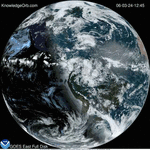(NASA) – Astronomers using NASA’s Hubble Space Telescope have found that Markarian 231 (Mrk 231), the nearest galaxy to Earth…
Category: Astronomy
Images of Planet outside our solar system published. 51 Eridani b
For years the hopes of actually seeing a planet outside our own solar system have been tied to the James…
Perseid Meteor Shower could be best of 2015
This week will be the peak viewing time for the annual 2015 Perseids Meteor Shower, with predicted rates of up to…
Animated Flyover of Pluto’s Icy Mountain and Plains
(NASA) – This simulated flyover of Pluto’s Norgay Montes (Norgay Mountains) and Sputnik Planum (Sputnik Plain) was created from New…
New Active Large Sunspot Coming Into View
We could see a continuation of the recent rather heavy solar weather as a new, not yet named sunspot comes…
Hubble Observes One-of-a-Kind Star Nicknamed ‘Nasty’
(NASA, ESA) -Astronomers using NASA’s Hubble Space Telescope have uncovered surprising new clues about a hefty, rapidly aging star whose…
Explore the Universe Using New Hubble Public Research Tools
A new astronomy research tool which makes exploring the universe as easy as pointing and clicking has been released by our…
Hubble finds dust forming young planet around new star
(NASA) – Over a decade before planets were found orbiting normal stars, the astronomy world was intrigued by the discovery…











